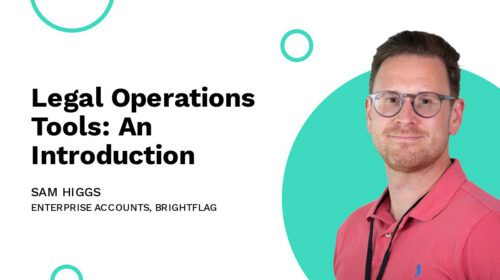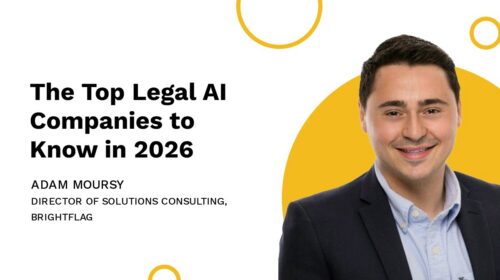Why In-House Legal Needs to Embrace A.I.
I’ve made no secret of my affection for ChatGPT. I use it in private, use it in public, and encourage my colleagues to use it as well.
But as good as it is as a general productivity tool, it seems to operate even better as an in-house legal lightning rod.
Maybe it’s because the entry barriers were lower. Maybe it’s because the stakes feel higher. But I can’t remember any technology inspiring the same frequency or intensity of debate among corporate counsel.
And I’m glad it has. Because now that the initial buzz around the application (ChatGPT) is fading away, we can get a much more impactful conversation about the underlying technology (AI) underway.
Specifically, which is the bigger risk for in-house legal teams: AI adoption or AI inaction?
The Real A.I. Risk for In-House Legal
Lawyers are natural risk detectors. It’s a role we’re trained to play and one our clients value. So it’s no surprise to see the legal community acting as a cautionary voice in various AI debates.
I just want to make sure we’re focusing on the right risks and not getting distracted by overstated concerns.
First, it’s important to remember that product innovation always inspires a small group of vendors to sow fear, uncertainty, and doubt in the marketplace. It’s a playbook many of us will recognize from last decade, when certain suppliers insisted that cloud-based solutions would never be fit for Legal. So please consider the source and their motives whenever you hear someone outright dismissing a category of technology.
As for legitimate risks, I’m seeing what you are. Many have already noted practical concerns related to data privacy, IP infringement, and AI hallucination. And I’m sure we’ve only scratched the surface when it comes to discovering potential ethical dilemmas.
But let’s not forget that AI encompasses a wide spectrum of solutions. ChatGPT is just one application of Generative AI (GAI), which is just one application of Large Language Models (LLMs), which are themselves just one subcategory of AI.
Commercial maturity and risk severity vary greatly across this spectrum. In each case, however, in-house lawyers still have every right to interrogate the AI models and risk mitigation measures employed by prospective vendors.
These dialogues are a natural and necessary step in the evolution of any emerging technology. And, in my experience, most vendors openly invite such conversations. (They’ve usually been thinking about the big questions years longer than you have and would be eager to exchange ideas that could ultimately strengthen their product.)
So whatis the most urgent risk? In my opinion, it’s avoiding AI conversations altogether.
As my friend Olga Mack recently underscored, in-house counsel have a duty to understand the applications, implications, and limitations of AI usage within their organizations. This is especially true given the low entry barrier around tools like ChatGPT. (Personally, I’d be shocked if someone in your company isn’t already putting it into play — with or without Legal’s blessing.)
But the consequences of AI avoidance go far beyond the delayed development of an acceptable use policy. In my view, you’d risk lowering the ceiling on both departmental performance and your own career potential.
The A.I. Opportunity for In-House Legal
To their credit, in-house counsel seem to be more curious and less dismissive than most lawyers when it comes to AI’s potential. This likely stems from a few factors. They’re organizationally incentivized to find time savings (not pad billable hours ?), they’re personally motivated to improve work-life balance, and they’re physically closer to the business teams at the forefront of AI adoption.
So what’s stopping corporate legal departments from committing to a full AI embrace?
I think the resistance is more emotional than technical. Because regardless of setting, every lawyer I know is extraordinarily attached to their work. We’re quick to assume ownership of a project, we’re committed to investing the (paid or unpaid) hours required to get it right, and we take great satisfaction from task completion.
Unfortunately, these strengths also get us into trouble. We see that we can do it all and assume that we should. We fear that delegating or outsourcing will be perceived as a cop-out. And, as a result, we find ourselves drowning in a high volume of low-value tasks.
This concept of the Value-Volume Matrix anchors my earliest conversations with all TLB clients. Because the math just isn’t adding up for today’s corporate legal departments. Workloads are growing, in-house resources are shrinking, and teams can only rebalance the equation by introducing external forces.
These forces have traditionally arrived in the form of outside counsel or legal optimization professionals — and both will continue to play vital roles in the resourcing mix. But, even as the founder of a legal optimization company myself, I feel confident saying that the greatest untapped force is actually AI. And I say that for a reason you might not suspect.
Artificial Intelligence, Real Change
The productivity boost experienced by in-house legal teams that leverage AI solutions is already undeniable. But the result I’m most excited by is more of a cultural shift.
Far from posing a threat to the humans who embrace it, I believe AI is handing lawyers a once-in-a-generation opportunity to redefine the value of their work.
None of software’s (literally) superhuman strengths overlap with activities in-house lawyers love or business executives value. (Spoiler: Accurate invoice review and efficient case research probably won’t be the reasons for your next salary increase!) And most of the personal triumphs and career breakthroughs I’ve witnessed were the result of highly-nuanced soft skills that most AI tools aren’t even interested in replicating.
If we embrace the rightful role of AI within our organizations, we can gradually:
- Allocate more time toward creative, strategic, value-adding work
- Spend more of that time developing partnerships with business colleagues
- Redefine our value through strategy and results (not time and tasks)
We have the opportunity to design the kind of days in-house legal pros have wanted all along.
A.I. Legal Tech Worth Your Attention
I share my views on AI’s ultimate potential not only because I think they’re entirely plausible, but also because they’re emotionally resonant.
I want in-house counsel to know that there’s more to gain than just a minor productivity edge — the foundations of the profession are ripe for reimagining. And among the teams I’ve seen complete successful legal tech transformations, each one eventually had to draw motivation from a deeply felt sense of mission.
Still, I don’t want my description of an ideal future to obscure the current progress in the field. I also appreciate that a topic as technical as AI is easier to learn through application than abstraction. (It was for me!). So let me leave you with a few suggestions for categories worth watching.
- Legal invoice review. Supervised machine learning models can interpret narrative descriptions within legal invoices — categorizing billed services, summarizing timekeeper contributions, and flagging guideline violations
- Contract management. Supervised machine learning models can interpret contract language, extract data, and analyze risks. Generative AI tools can offer suggested redlines as well.
- Legal research. Generative AI tools can take your search query, interpret relevant case law, and compose easily digestible summaries in a matter of seconds.
- Knowledge management. Generative AI tools can make knowledge management tools more accessible, facilitating faster searches via chatbots (You can use them within the department and/or as Legal’s “front door” to the wider business ?).
Join the Conversation
I believe the future state of AI in the workplace will be better for everyone if in-house legal teams have a voice in the conversation.
But, as with the technology itself, there’s also a powerful compounding effect at play. Small, fast, and frequent steps taken early will have dramatically more impact than large initiatives launched later.
So start experimenting soon — and let me know what you see when you do!



